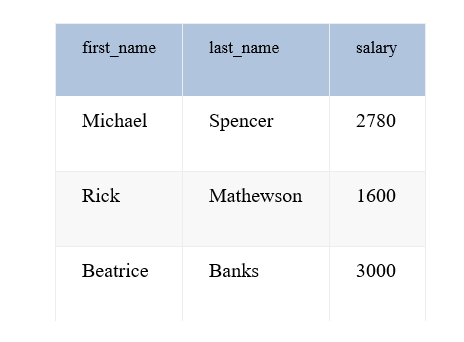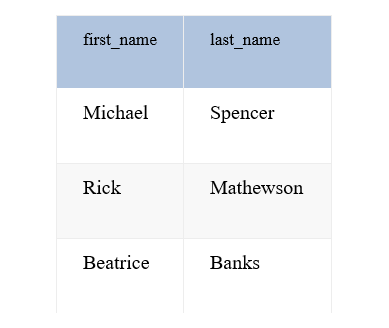Basic and Advanced SQL Interview Questions for 2021

Recently, Structured Query Language or SQL (for short), a standard programming language that is domain-specific, has become extremely useful in storing and managing data in DMS or Database Management Systems.
And now that Database Management Systems are becoming even more popular and seeing increasing applications in virtually every type of software application, we see those skilled in SQL also becoming hotcakes and highly desirable in the vast data science marketplace.
So, perhaps you possess these skills already but need to brush up for an interview. Well, you have come to the right place because below, we have gathered the most advanced SQL interview questions and their answers. Going through this article should help you sufficiently prepare and make you ready to smash any SQL job interview because we have covered everything from the most basic to the most tricky SQL interview questions.
SQL General Concepts You Need to Know Before an Interview
Let us start by refreshing on what the general concepts in SQL are as this would help us build a good foundation for the SQL basics for interview.
- SQL and Relational Database
As stated earlier, SQL would be an ineffective language without a database. Hence the need to understand what a database is.
A database is defined as a set of well-structured data that can be easily accessed. A school or bank data storage is a fine example of a database.
Aside from easy accessibility, a database also makes data storage, retrieval, and management exceptionally seamless.
A relational database is defined as a stack of values with a pre-defined relationship between them. If these values are in a tabular form, the association could exist across rows or columns. Other common types of relational representations include records, attributes, primary keys, and foreign keys.
- SQL Commands Categories
Commands in SQL are used to define or change the structure of a particular value in a database in the shortest possible time. The most common SQL commands categories:
- Data Definition Language (DDL) is used in creating, altering, dropping, and modifying the structures of objects found in a database. The commands include create, drop, truncate, and alter.
- Data Control Language (DCL) is used for providing or revoking the necessary security to the objects in a database. They include commands such as grant and revoke.
- Data Manipulation Language (DML) is used for inserting, deleting, or updating the structures of the objects or values in a database. The options are usually insert, delete, and update.
- Data Query Language (DQL) is a command used to retrieve values from a database.
- Transaction Control Language (TCL) is the type of SQL command used to manage all transactions within a database.
- SQL Joins
Joins are used for putting together values or records from two or more tables. And the different kinds of joins include:
- FULL Join allows for the selection of all records from either the right or left table.
- INNER Join is used for selecting records that have matching values from all the tables.
- RIGHT Join selects records from the table on the right-most corner and any records with match values in the left table.
- LEFT Join is used for selecting records from, first, the table in the left-most corner along with any records with matching values in the right table.
- SQL interface
The process of interfacing SQL is a concept that allows us to seamlessly combine SQL with other equally powerful programming languages such as Python and R. Once this is done, SQL can become an all-round tool that can be conveniently used for data analysis, datasets preparation, and creation of various data visualization tools.
- Advanced SQL
Advanced SQL is a concept that can be used to create complex reports and in producing sophisticated pattern matching. It usually includes certain keywords such as UNION, UNION ALL, INTERSECT, IDENTITY, TOP, CASE, MINUS, DECODE, AUTO-INCREMENT, etc. Many of the complex SQL interview questions are usually on this topic so you may need to pay closer attention here.
Basic, Intermediate, and Advanced Interview Questions
Now to dive into SQL job interview questions properly. We have grouped these SQL scenario-based questions into basic, intermediate, and advanced interview questions depending on the position you might be applying for.
Basic SQL Interview Questions
The questions below are the most basic interview questions on SQL queries:
Question 1: What is SQL, and how can you differentiate it from NoSQL?
Answer 1: SQL stands for Structured Query Language and is defined as a non-procedural language used for operating any relational database. The language is crucial for performing data storage, data retrieval, data updates, and data management.
SQL can be differentiated from NoSQL in the following ways:
| Features | SQL | NoSQL |
| Database Type | Relational | Non-relational/Distributed |
| Tools | Comprised of several tools for both reporting and performance analysis | Most useful tools are unavailable |
| Standardization availability | Yes | No |
| Price | More expensive | Lowered cost since they are mostly open-source |
| Example of a type of database | Oracle, SQLite, Postgres, etc. | MongoDB, BigTable, Cassandra, etc. |
Question 2: What is a Database and a Database Management System?
Answer 2: A database can be explained as a vast and highly complex collection of structured data, usually stored, retrievable, and managed in a local computer system.
A Database Management System (DMS) is software used in creating, retrieving, updating, and managing a database. It is important for making a database consistent, organized, and easily accessible.
Question 3: Define a field and explain what a table is
Answer 3: A field can best be defined as any specified number of columns that remain present and constant within any given table.
While a table is a set of data organized as vertical rows and horizontal columns with a model, tables are generally characterized by rows, columns, fields, and records. An example of a table can be given as follows:
Table: Employee
Field: Emp Name, Emp ID, Date of Birth
Data: James, 77890, 4/20/1992
Question 4: Define the following terms; primary key, unique key, and foreign key
Answer 4: A primary key can be defined as combining different fields that uniquely specify a row. These types of keys cannot be NULL.
A unique key can be defined as constraints that ensure that all the values in a column are different and allows for easy identification of each record within a database.
Then lastly, a foreign key can be defined as a single or collection of fields within one table that can be related to a primary key of another table.
Question 5: Define an SQL Join, then list the types of Joins you know
Answer 5: An SQL Join can be defined as a keyword that can be used to query data from multiple tables based on what relationships exist between the fields and values of the tables involved.
The types of SQL Joins include FULL Join, INNER Join, RIGHT Join, and LEFT Join.
Question 6: What is an index? How many types of indexes do we have? Can you list and explain each one?
Answer 6: An index is used for tuning performance to facilitate the faster retrieval of records from any given table.
There are three types of indexes, as explained below:
- A Unique Index has applied automatically after a primary key is defined and prevents the duplication of records
- A Clustered Index helps to rearrange the physical order of a table and supports search based on the values of the keys present
- A NonClustered Index does not alter or rearrange the original order but instead works by maintaining the logical order of the table
Question 7: Define the following terms; SQL queries and subqueries
Answer 7: The SQL Queries are defined as codes written to initiate the extraction of information from a database
While SQL Subqueries can be defined as queries contained inside other queries, with the outer query serving as the main query and the inner query the subquery. The results of a subquery are what are passed on into the main queries.
Question 8: Could you differentiate between the DELETE and TRUNCATE commands?
Answer 8: DELETE is a command used for removing only pre-defined rows from a table without freeing up the containing space, while TRUNCATE is a command used for removing all the rows and freeing up all the containing spaces.
Question 9: How would you explain Data integrity?
Answer 9: Data integrity entails that the accuracy and consistency of any given data through its lifecycle, critical design aspect, implantation, and usage are assured.
Question 10: Explain what an AUTO-INCREMENT means
Answer 10: We can define AUTO-INCREMENT as a keyword that allows a user to create a unique number every time a new record is added to a table.
Intermediate SQL Interview Questions
Below are some intermediate SQL questions and answers.
Question 1: Explain a user-defined function and list all the types of user-defined functions you know
Answer 1: A User Function is a function written once (and called back whenever necessary) to allow for the use of logic whenever logic is required.
There are three main types of User Functions, namely:
- Scalar User Function
- Inline Table-Valued User Function
- Multi Statement Valued User Function
Question 2: Explain how you could create an empty table from an existing table
Answer 2: To create an empty table from an existing table, we could use the code below:
Select * into studentcopy from student where 1=2
We could copy the above to a new table but without rows
Question 3: Could you differentiate between NULL value and zero?
Answer 3: A NULL value means the value of a table is missing or unknown or represents the general absence of a quantity or information. In contrast, a ZERO value means that the value is known and equal to zero (0).
Question 4: What SQL command would you use to fetch the first five characters of a string?
Answer 4: The two major ways to retrieve the first five characters of a string are as follows:
Using the SUBSTRING command:
Select SUBSTRING(StudentName,1,5) as studentname from student
Using the LEFT command:
Select LEFT(Studentname,5) as studentname from student
Question 5: Which SQL operator would you use in creating a query for pattern matching?
Answer 5: The SQL operator LIKE is what is generally used in queries for pattern matching. For instance, we can use percentage (%) for matching zero or more characters and underscore (_) for matching one character (no more, no less).
Advanced SQL Interview Questions
These tough SQL questions and answers are the types you may be confronted with if you are gunning for best roles. Some of the most advanced SQL questions include:
Question 1: How would you recover a lost root password?
Answer 1: To recover a lost root password, we would first use the command “skip-grants-table,” and once that is done, we would set a new root password, restart the database in normal mode and enter the newly created root password.
Question 2: Write an easy code to quickly retrieve common record from two separate tables
Answer 2: To retrieve common records from two separate tables, we can use the code below:
Select employeeID from employee. INTERSECT Select EmployeeID from WorkShift
Question 3: Define a view and write a code to create a view
Answer 3: View can be defined as a virtual table or an SQL statement that has already been stored. Views are built using data from a single of multiple existing/physical tables.
If we had a physical table as described below:

Using the code below, we can create a simple view:
CREATE VIEW employee_list AS
SELECT first_name,
last_name
FROM salary;
The code below can be used to run it:
SELECT *
FROM employee_list;
And the results below are displayed:

Question 4: How would you handle a scenario where the data disk gets overloaded?
Answer 4: Correcting disk overload entails using a soft link to create an additional location where files like .idb and .frm can be safely stored.
Question 5: Describe a “datawarehouse” and state its importance in SQL
Answer 5: A Datawarehouse is a warehouse for data and is defined as a system for analyzing and reporting data.
For importance, they can serve as repositories for integrated data until you are ready to use them.
Interview Tips and SQL Basics for Interview
Aside from the above tricky SQL queries for interview, we believe that the tips below will also help boost your confidence and set you on the right path.
- Practice any SQL queries you can lay your hands on
- Be ready for anything
- Refresh your knowledge on SQL terminologies and common words
- Be honest and very open about your skill level
- Do not forget to get adequate real-life SQL based experience
Conclusion
Whether you are looking to land your first major SQL job or have been in the game and only need to upgrade to a higher level, we believe everything here – from the basic to the advanced SQL interview questions would greatly help you.
We also look forward to updating this list of SQL advanced interview questions and answers from time to time, as well as creating other exciting contents, and the only way you will not miss out on anything is if you are duly subscribed to our email newsletter. Also, share this content with your friends if it has offered you any value.




